Module 2 Unit3 Computers(全单元)[上学期]
文档属性
| 名称 | Module 2 Unit3 Computers(全单元)[上学期] | 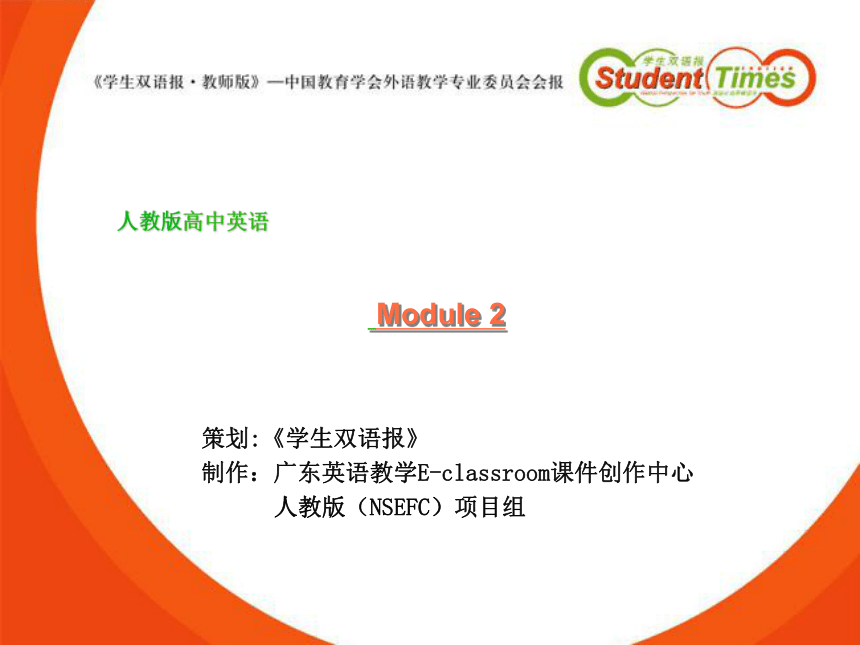 | |
| 格式 | rar | ||
| 文件大小 | 2.0MB | ||
| 资源类型 | 教案 | ||
| 版本资源 | 人教版(新课程标准) | ||
| 科目 | 英语 | ||
| 更新时间 | 2006-12-04 10:42:00 | ||
图片预览

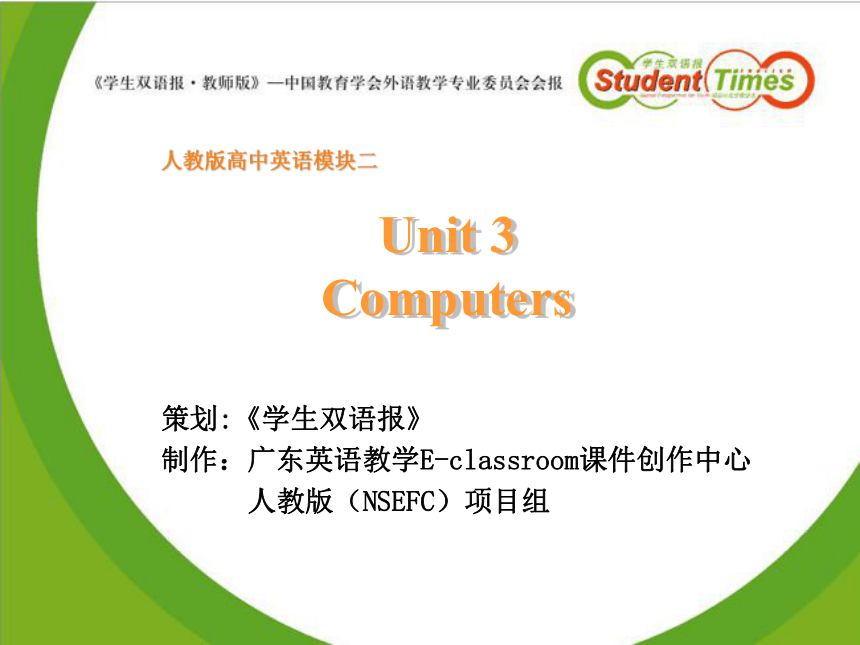
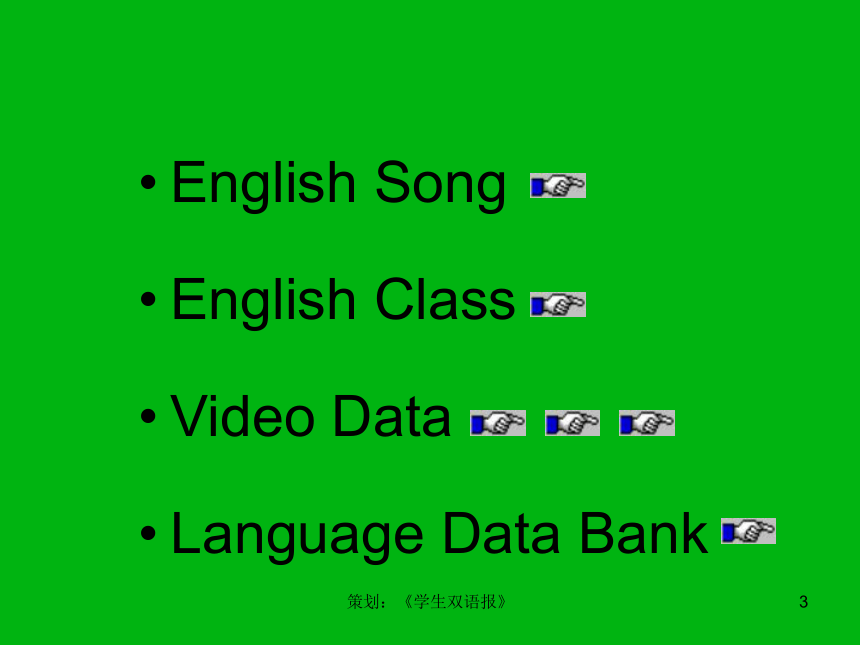
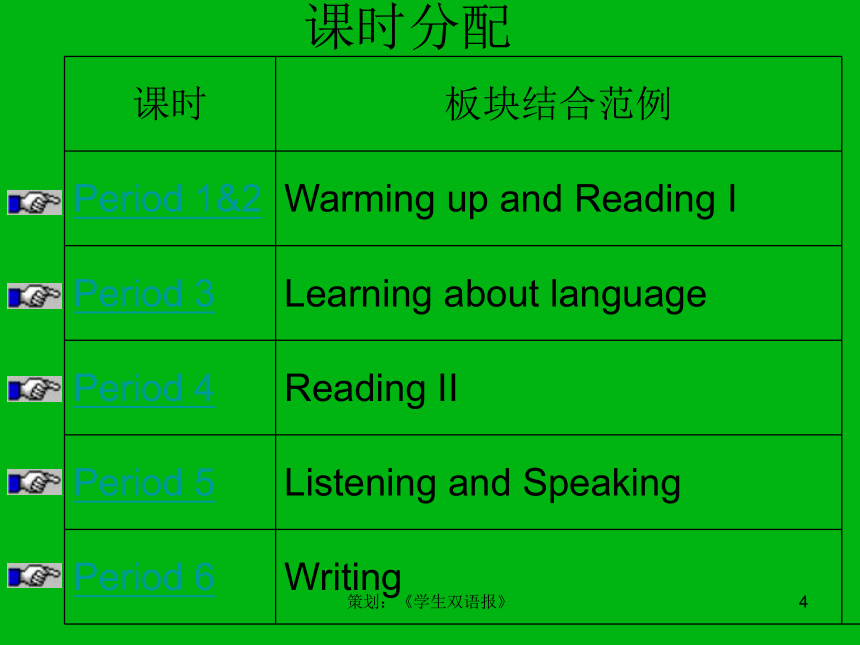
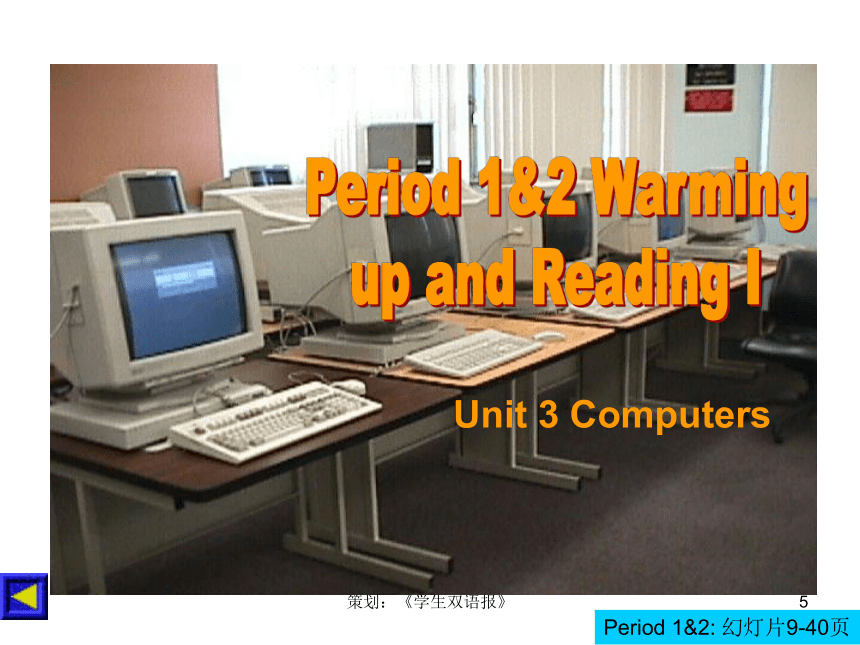
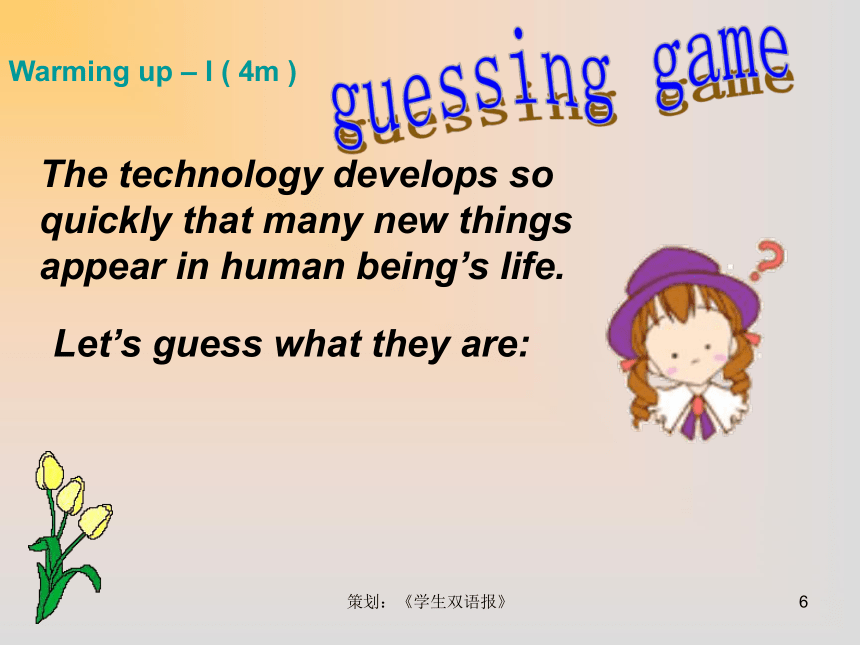
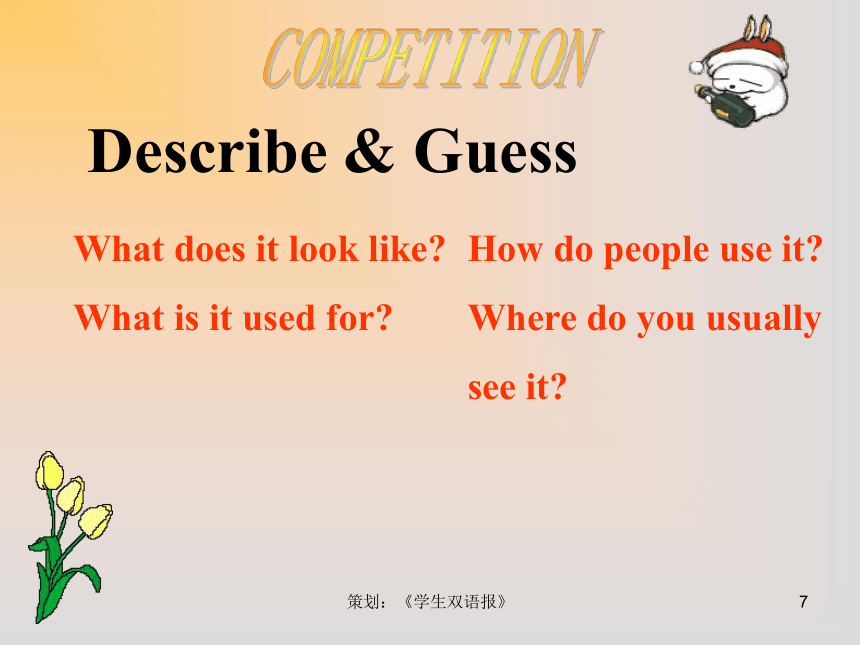
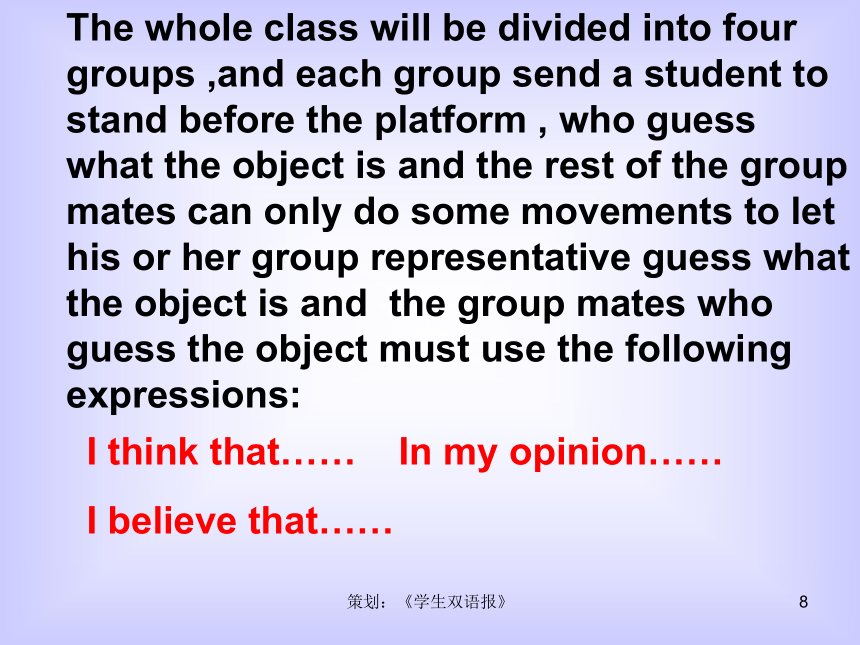
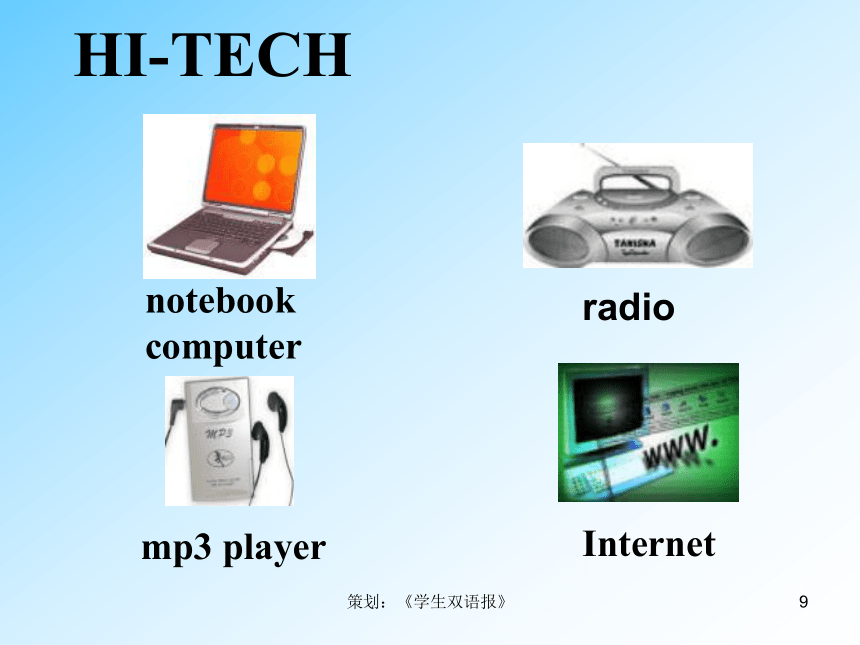

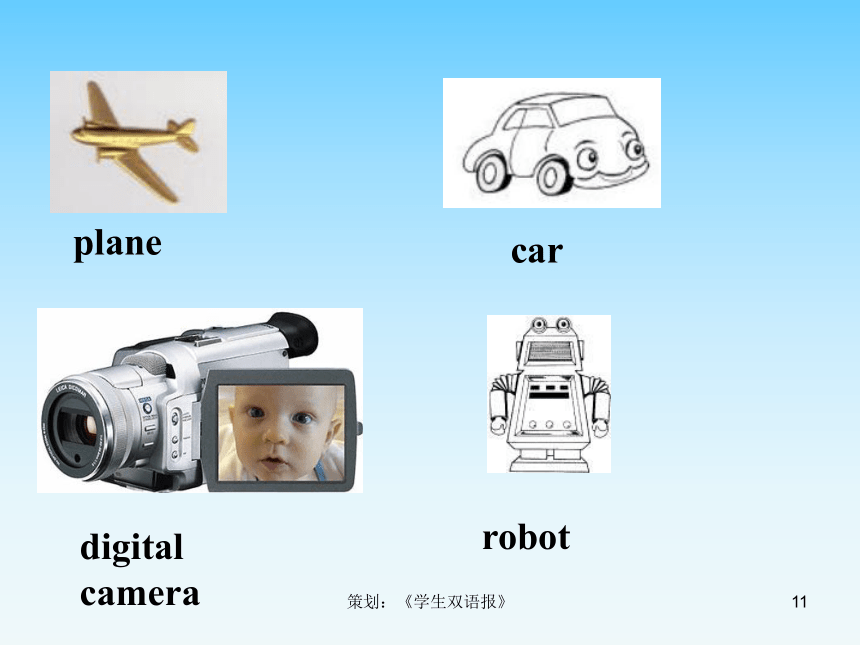
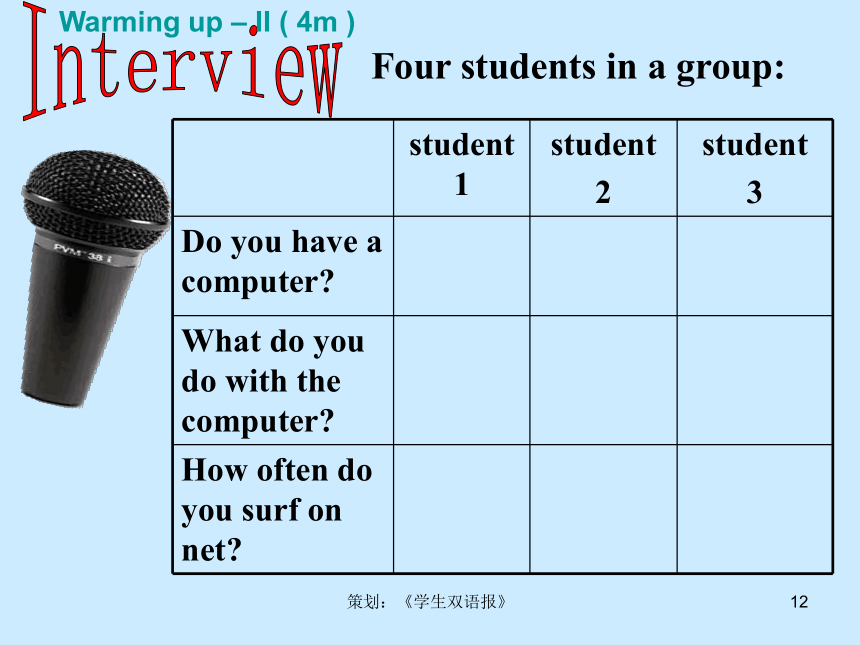
文档简介
课件106张PPT。策划:《学生双语报》1 Module 2 策划:《学生双语报》
制作:广东英语教学E-classroom课件创作中心
人教版(NSEFC)项目组人教版高中英语 策划:《学生双语报》2 Unit 3 Computers策划:《学生双语报》
制作:广东英语教学E-classroom课件创作中心
人教版(NSEFC)项目组 人教版高中英语模块二策划:《学生双语报》3English Song
English Class
Video Data
Language Data Bank策划:《学生双语报》4课时分配策划:《学生双语报》5Period 1&2 Warming
up and Reading IUnit 3 Computers Period 1&2: 幻灯片9-40页策划:《学生双语报》6The technology develops so quickly that many new things appear in human being’s life.Let’s guess what they are:guessing gameWarming up – I ( 4m ) 策划:《学生双语报》7Describe & GuessWhat does it look like?
What is it used for?
How do people use it?
Where do you usually
see it?COMPETITION策划:《学生双语报》8The whole class will be divided into four groups ,and each group send a student to stand before the platform , who guess what the object is and the rest of the group mates can only do some movements to let his or her group representative guess what the object is and the group mates who guess the object must use the following expressions:I think that…… In my opinion……
I believe that……策划:《学生双语报》9notebook computer InternetHI-TECHmp3 playerradio策划:《学生双语报》10HI-TECHmobile phoneTV setrefrigeratorair-conditioner策划:《学生双语报》11planecardigital camerarobot策划:《学生双语报》12InterviewFour students in a group:Warming up – II ( 4m ) 策划:《学生双语报》13mouse
monitor
do the word processing
keyboardPre-reading – I ( 1m ) 策划:《学生双语报》14What can you do with the mouse?
What’s the use of the keyboard?
What does a monitor of a computer do?
What helps to control the computer?
What can we do on the computer?
DiscussionPre-reading – II ( 2m ) 策划:《学生双语报》15What can we do on a computer and through the Internet?策划:《学生双语报》16Computer and Internet type my homeworkdraw picturesplay gamescommunicate with my friends.gather information for my lessonslisten to musicwatch movies……策划:《学生双语报》17Reading Scan the text and then answer the following questions:
1.Who is the speaker?
2.What the text might be about?Reading – I Scanning ( 2m )策划:《学生双语报》18It is a computer.The history / development/
applications of computers.1.Who is the speaker ?2.What the text might be about?策划:《学生双语报》19Find out three sentences to support who the speaker is in the story.1.Then in 1822 I was built ….
(Itself was the first design of a computer)2.My real father was Alan Turing.
(He designed the first real computer.)3.However, people thought I was simple-minded until….,
(It has artificial intelligence.)策划:《学生双语报》20Fill in the blanks with information from the reading :According to the timeReading – II Skimming ( 3m )策划:《学生双语报》21Timeline1642:_____________________________________
_____:The Analytical Machine was made by Charles Babbage.
1936:_______________________________
___________________________
1960s:_________________________________
_____: The first family of computers was connected to each other.
1970s:_________________________________
Now:_____________________________________The computer began as a calculating machine1822Alan Turing wrote a book to describe how computers could be made.Computers had new transistors and became smaller.1960sComputers were brought into people’s homeComputers connect people all over the world together.策划:《学生双语报》22Explain how the computer technology has been developing and complete the following chart. Then give a brief oral presentation on the development of computer technology with the help of the chart.Reading – III Detailed reading ( 3m )策划:《学生双语报》23calculating machineanalytical machineuniversal machineartificial intelligencePC (desktop/ notebook)Internet?策划:《学生双语报》24Only calculatingFollowing instructions from cards with holesSolving any mathematical problemHaving artificial intelligenceClever and quickerTalking to humansConnecting peopleReading – IV ( 3m )Discuss in pairs and work out the changes of the computer abilities.策划:《学生双语报》25TIPSThe main idea:
The text tells us that computers progress from the calculating machine to the machine with artificial intelligence.Discuss in groups of four and work out the main idea of the the passage.Reading – V ( 2m )策划:《学生双语报》26The development of the calculating machine:策划:《学生双语报》27策划:《学生双语报》28An abacus is an ancient tool used for counting.
The abacus has been in existence in China
since the second century BC until now,
although the oldest counting boards
have been found in fourth century BC Rome. 策划:《学生双语报》29The first electronic counting machine
in continental Europe. Designed under
the leadership of Academician S.A. Lebedev
(Kyiv, Ukrainian National Academy of
Sciences, 1948-1951). It was built to solve some mathematical
Problems.
The first tasks were solved on January, 4, 1951. But it is too big.策划:《学生双语报》30A calculator is a new calculating machine which can solve a large number of mathematical problems.策划:《学生双语报》31A PC is a personal computer which can solve all kinds of problems and is used widely now.策划:《学生双语报》32A notebook computer is a kind of useful computer which can be taken conveniently like a notebook.策划:《学生双语报》33Something to think about:Topic
The Internet
Advantages:
Disadvantages:debatePost reading ( 5m )策划:《学生双语报》34TIPSSome words on the Internet:策划:《学生双语报》35Homework Surf the Internet to find more information about how computer influence people’s lives and present it to your classmates in the next class.策划:《学生双语报》36Take a break! 策划:《学生双语报》37Period 3 Learining about Language Unit 3 Computers Period 3: 幻灯片41-57页策划:《学生双语报》38Checking answer – I (2m)Answer keys for Ex.1 on Page 19:1.___________
2.___________
3.___________
4.___________
5.___________
6.___________
7.___________
8.___________
9.___________
10.__________completely
complete change
to make something happen
when a baby or animal is born
unable to understand difficult things
pass
take correct action
broadcast on several different channels
indeed
used to show that something happens in spite of a problem
anywaytrulynetworkdeal withgo bysimple-mindedbirthso…thatrevolutiontotally策划:《学生双语报》39Checking answer – II (2m) Answer keys for Ex.2 on Page 20:1.revolution 2. network
3. so …that 4. went by
5. totally 6. simple-minded
7. Anyway 8. deal with策划:《学生双语报》40Checking answer – III ( 4m )Answer keys for Ex.3 on Page 20:Life (total/totally)changed when I went to university.
I was (amazed / amazing) to find that I won the competition to design a new computer.
The competition was so (excited / exciting) that we cheered all evening.
I was so (excited/ exciting) at the thought of meeting Yang Liwei that I could not sleep.
Robots can be bought so (cheap/ cheaply )that I gave one to each of my friends.
It was so (unlucky/ unluckily) that you lost your watch at the concert.策划:《学生双语报》41Grammar: Group A
1. We have finished our homework.
2. Many visitors have visited the Great Wall.
3. Mike has seen two films since last month.
4. The Russian government has turned these palaces into museums.
策划:《学生双语报》42Group B
1. Our homework has been finished by us.
2. The Great Wall has been visited by many visitors.
3.Two films have been seen by Mike since last month.
4. These palace have been turned into museums.
策划:《学生双语报》43分析:A组强调动作的执行者,是主动语态,
结构:主谓宾,
相同点:两组都是完成时态,
结构: have/has+过去分词
B组的句子强调动作的承受者, 是被动语态.
相同点: 两组都是完成时态
结构: 助动词 have/has been +过去分词
策划:《学生双语报》44Have/ has been Ved 现在完成时的被动语态1.The new bridge over the Yellow River has just been completed.
2.Many more buildings have been built in the past ten years.表示到现在为止已经完成的某个被动的动作策划:《学生双语报》451.被动语态介词固定搭配不能省略。
He has thought of a way of solving the problem.
Eg.The accident which happened yesterday surprised me.=A way of solving the problem has been thought of.2.break out/ happen/ take place/ arrive/ become/ die/ disappear etc 不及物动词没有被动语态策划:《学生双语报》463.带双宾语的动词give /send/bring/ take/teach/show/ tell/ make/ sing/ write/ sell/buy/ ask/ pay/ borrow/ lend/ hand/ offer/provide/ past/get/promise 变被动语态有两种方法:(2)=The book has been given to him.(1)=He has been given the book.Eg.I have given him the book.策划:《学生双语报》47 (2) =We have been offered the most comfortable service by him.He has offered us the most comfortable service.(1) =The most comfortable service has been offered to us by him.策划:《学生双语报》48Change the following sentences into the present perfect passive voice. Put the verbs into the correct form.We have bought a new personal computer.
2.We have found many problems with our new computer.A new personal computer has been bought by us.Many problems have been found with our new computer by us.策划:《学生双语报》493. They have built a PC the way we wanted.
4. They have just joined our computer to the Internet.
5. We have used the computer every day since we bought it.
6. We have written a lot of e-mails on the computer in the past year.A PC has been built the way we wanted by them.Our computer has been joined to the Internet by them.The computer has been used every day since we bought it.A lot of e-mails have been written on the computer in the past year.策划:《学生双语报》50(2004高考 江苏卷) More patients _________in hospital this year than last year.
treated B. had treated
C. had been treated D.have been treated
2. (2004 高考 北京卷)The mayor of Beijing says that all construction work for the Beijing Olympics __________ by 2006.
has been completed B. has completed C. will have been completed D. will have completed D高考链接C策划:《学生双语报》513. (2004高考 广西卷)---- The window is dirty.
---- I know. It ________ for weeks.
hasn’t cleaned B. didn’t clean C. wasn’t cleaned D. hasn’t been cleaned
4.(2004高考 湖北卷)--- George and Lucy got married . Did you go to their wedding?
--- No, I ___________. Did they have a big wedding?
A. was not invited B. have not been invited C. hadn’t been invited D. didn’t inviteDA策划:《学生双语报》52Homework Finish the exercises of “Using Structures” on P 57.策划:《学生双语报》53Take a break! 策划:《学生双语报》54Period 4 Reading IIUnit 3 Computers Period 4: 幻灯片58-70页策划:《学生双语报》55Who is an Android?Warming up ( 1m )策划:《学生双语报》56Questions
What part does Andy play in the football team?
2. What is Andy’s opinion about the match
in Seattle?
3. How does the programmer help Andy to make
up new moves? He is a striker.He thinks that the team who won the
first place cheated.Reading -- I ( 5m )Read the text and answer the following questions.
( Students can discuss in pairs. )She programs possible moves that Andy can use if a new situation arises.策划:《学生双语报》57Reading TaskThe Sporting Robot Reading the passage on page 58策划:《学生双语报》58Reading the passage, and suppose you are Hua Fei’s programmer now keep a record of his performance.Excellent style and movement; Olympic standard.Wonderful turns, dives,cirles and dancesSilver medal for flying exercisesBegan very well but failed through no fault of his own.Parachute failed to open.Two new legs and a new head.Reading -- II ( 5m )策划:《学生双语报》59Questions on P23 may help you.
Do not forget to use the expressions of making a decision and reasoning.Task 3 Design your Android
Group-work:
策划:《学生双语报》60策划:《学生双语报》61the expressions of making a decision and reasoning.
I think that…
In my opinion…
I believe that…
Let’s make our decision.
I’ve decide that…
The advantages /disadvantages are…
What’s your reason?
Why do you think so?
I don’t like this one because…
I think this one is better because…
making a decisionreasoning策划:《学生双语报》63Sample:
A: what kind of robot have you decided
to make?
B. I’ve decided that I should have a dog
robot.
A: What is your reason?
B: ….
A: What would you like it to look like?
B: …
A: What would you like it to do for you?
B:…策划:《学生双语报》64After the students finish their designing a robot ,ask some groups to describe the robots they design.策划:《学生双语报》65Homework Try to search some information about the future robots , then four students in a group to make a poster to introduce the robot you design . You can draw the picture in your poster.策划:《学生双语报》66Take a break! 策划:《学生双语报》67Period 5 Listening and SpeakingUnit 3 Computers Period 5: 幻灯片71-80页策划:《学生双语报》68Which is IT, in your opinion?策划:《学生双语报》69Before listening, talk about:
Advantages
VS.
Disadvantages
of each type of IT.
Task 1 Speaking
Group-work:
策划:《学生双语报》70Team 1—TV
Team 2—Web
Team 3—Radio
Team 4—Book
Team-work:
Listen to the tape:Task 2 Listening策划:《学生双语报》71 Exchange your answers with some of your teammates.
Group-work:
? Tell me what you got.策划:《学生双语报》73Listen to it again, check whether your team get the right answers.
Team-work:
策划:《学生双语报》74策划:《学生双语报》75HomeworkFind two pieces of material and practice your listening.策划:《学生双语报》76Take a break! 策划:《学生双语报》77Period 6 WritingUnit 3 Computers Period 6: 幻灯片81-88页策划:《学生双语报》78What do you know about robots or androids?Today ,robots or androids can be found in virtually every field, from medical to transport, industrial to recreation.策划:《学生双语报》79Some robots
In factories
In farms
In families
In libraries
In hospitals
In banksA model策划:《学生双语报》80What’s the use of robots?1. They do the job at least as well, if not better.
2. Never complain about physical problems (as long as they are maintained).
3. Do not need days off.策划:《学生双语报》81 Writing task Suppose you are a robot and work for a family with one child who is very spoiled.The parents want you to do everything for them. The parents are nice, but they often ask you to watch over their child. How do you feel? What would you do if the child asked you to do his/her homework for him/her? Would you ever tell the child “no”?策划:《学生双语报》82You may begin like this:Hello, everybody. My name is ________. I’m a 321 model android. I work for the Li family …策划:《学生双语报》83HomeworkExchange the composition with your partner and try to correct it. 策划:《学生双语报》84Take a break! 策划:《学生双语报》85Language points for Reading I
Video dataLanguage Data Bank幻灯片89-110页策划:《学生双语报》861. in common : for or by all of a group 共同的; 共有的 the land owned in common by the residents 居民共有的土地In common 常常同have连用,如:
have nothing in common
have little in common
have something in common
have a lot in common无共同之处几乎无共同之处有一些共同之处 有许多共同之处策划:《学生双语报》872.simple-minded:showing very little intelligence 头脑 简单的;笨的。Richard is smart but__________________________________.心不在焉的
虚心的,没有偏见的
心胸狭窄的
意志坚强的
低能的,愚蠢的里查德很聪明但他有许多头脑简单的朋友。he has a lot of simple-minded friends.absent-mindedopen-mindednarrow-mindedstrong-mindedweak-minded策划:《学生双语报》883.go by
(1)pass 经过,过去
① 时间慢慢过去。
② 勿失此良机。Time went by slowly.Don’t let this opportunity go by.根据交通规则判断,司机应该被罚。_____________________, the driver should be punished. (2) judge by 依据……做判断Going by the traffic rule策划:《学生双语报》894. anyway 无论如何,总之,反正Anyway it’s worth trying. 不管怎样,这事值得一试。也许会下雨,但我们无论如何都要去。It may rain, but we’ll go anyway.策划:《学生双语报》905.deal with
我现在要处理这个问题。你们打算怎样处理本地区的水污染问题呢?How are you going to deal with the water pollution of this area?I will deal with the problem now.(1)处理,安排策划:《学生双语报》91(2)和……打交道,对付,收拾That man is easy to deal with.那个人很容易对付。(或打交道很容易)(3)论述,谈(某问题)These novels do not deal with reality.这些小说没谈及现实问题。策划:《学生双语报》92(1)n. process of being born, coming into the world 出生,出世,诞生他出身低微。He is___________.他虽然生在法国,但父母是英国人。He is British________ though he was born in France.那婴儿生下来就有七磅重。The baby weighed 7 pounds__________.6.birthat birthby birthof no birth策划:《学生双语报》93give birth to & be born
她生于1968年。She was born in 1968.be born 则表示“出生”她生了五个小孩。She gave birth to five children.give birth to 意为“生产,生下”,有时也作“使……诞生”解策划:《学生双语报》947.sound 系动词,听起来……注意:sound, look, smell, feel , taste 为系动词,后面可跟形容词、名词、介词短语作为其表语。系动词不能用于被动语态。你说的话听起来有道理。What you said sounds reasonable. 听起来像直升飞机的声音。That sounds like a helicopter. sound like “听起来像” like 为介词,其后跟名词、代词或动名词策划:《学生双语报》95It sounds as though/as if:音乐听起来多美啊!How sweet the music sounds!听起来似乎政府不知怎样做It sounds as though/if the government don’t know that to do.策划:《学生双语报》96 8. No one could recognize me after I got my new transistors in the 1960s. 20世纪60年代我有了新的晶体管之后,就没有人能认出我来了。
从走路的姿势你可以认出他来。You’ll recognize him____________.recognize
(1)vt. be able to identify again sb./sth. that one has seen, heard, etc.认出,听出by his walk策划:《学生双语报》97(2)vt. be willing to accept sb./sth. as what he or it claims to be or has been in the past 承认,认可
他们拒绝承认新政府。They refuse to recognize the new government.策划:《学生双语报》989.Then in 1822 I was built as an Analytical Machine by Charles Babbage.
后来到1822年,查尔斯.巴比奇把我制成了一架分析机。
Analytical Machine分析机Analytical
(1) adj. using analysis, of analysis 分析的,用分析法的策划:《学生双语报》99[联想]
(派) analyse (vt.) 分析 analysis (n.) 分析
analytical (adj.) 分析的 analyst (n.) 分析家
analytically (adv.) 分析地
depart (vi.)-----departure( n.)
similar( adj.) ---similarity (n.)
discuss (vt.)-----discussion (n.)策划:《学生双语报》10010.However, people thought I was simple-minded until they discovered I had “artificial intelligence”.可是人们认为我头脑简单,直到发现我有人工智能时,他们才不这么想了。
(1)adv. in whatever way or degree 无论如何,however 作为副词单独使用而不引导从句时,意为“然而”“不过”,在句中的位置非常灵活,可置于句首、句中或句末,常用逗号将however与句子隔开However策划:《学生双语报》101她非常努力,(尽管如此)然而她没有成功。She worked hard. However, she wasn’t successful.然而他弄错了He was mistaken, however.然而,这个问题还有它的另一面。There is, however, another side to this problem.策划:《学生双语报》102(2)引导让步状语从句时,表示“无论如何”“不管怎样”,相当于no matter how, 后接adj.或adv.
无论多热,他也不会脱掉外套。However hot it is, he will not take off his coat.策划:《学生双语报》10311.as 作为
As the years went by 当,,时候(表伴随)
= With the years going byAs students, we must make good use of time.He served as a servant in a five-star hotel.作为学生,我们必须利用好时间。他在一家五星级酒店里当一名服务员。策划:《学生双语报》10413. With 具有;有着
The man______________ is my brother.China is a country_______________________.with a long historywith thick hair中国是一个有着悠久历史的国家。那个有着浓密头发的男人是我的哥哥。策划:《学生双语报》105接动名词的动词有:enjoy/ finish/ practise/ consider/ miss/ admit /can’t help doing When he heard the sad news, he couldn’t help crying.When I am free, I enjoy listening to the light music.14.love doing当我有空的时候,我喜欢听轻音乐。当他听到这个悲伤的消息,他情不自禁地看了。策划:《学生双语报》106The End!
制作:广东英语教学E-classroom课件创作中心
人教版(NSEFC)项目组人教版高中英语 策划:《学生双语报》2 Unit 3 Computers策划:《学生双语报》
制作:广东英语教学E-classroom课件创作中心
人教版(NSEFC)项目组 人教版高中英语模块二策划:《学生双语报》3English Song
English Class
Video Data
Language Data Bank策划:《学生双语报》4课时分配策划:《学生双语报》5Period 1&2 Warming
up and Reading IUnit 3 Computers Period 1&2: 幻灯片9-40页策划:《学生双语报》6The technology develops so quickly that many new things appear in human being’s life.Let’s guess what they are:guessing gameWarming up – I ( 4m ) 策划:《学生双语报》7Describe & GuessWhat does it look like?
What is it used for?
How do people use it?
Where do you usually
see it?COMPETITION策划:《学生双语报》8The whole class will be divided into four groups ,and each group send a student to stand before the platform , who guess what the object is and the rest of the group mates can only do some movements to let his or her group representative guess what the object is and the group mates who guess the object must use the following expressions:I think that…… In my opinion……
I believe that……策划:《学生双语报》9notebook computer InternetHI-TECHmp3 playerradio策划:《学生双语报》10HI-TECHmobile phoneTV setrefrigeratorair-conditioner策划:《学生双语报》11planecardigital camerarobot策划:《学生双语报》12InterviewFour students in a group:Warming up – II ( 4m ) 策划:《学生双语报》13mouse
monitor
do the word processing
keyboardPre-reading – I ( 1m ) 策划:《学生双语报》14What can you do with the mouse?
What’s the use of the keyboard?
What does a monitor of a computer do?
What helps to control the computer?
What can we do on the computer?
DiscussionPre-reading – II ( 2m ) 策划:《学生双语报》15What can we do on a computer and through the Internet?策划:《学生双语报》16Computer and Internet type my homeworkdraw picturesplay gamescommunicate with my friends.gather information for my lessonslisten to musicwatch movies……策划:《学生双语报》17Reading Scan the text and then answer the following questions:
1.Who is the speaker?
2.What the text might be about?Reading – I Scanning ( 2m )策划:《学生双语报》18It is a computer.The history / development/
applications of computers.1.Who is the speaker ?2.What the text might be about?策划:《学生双语报》19Find out three sentences to support who the speaker is in the story.1.Then in 1822 I was built ….
(Itself was the first design of a computer)2.My real father was Alan Turing.
(He designed the first real computer.)3.However, people thought I was simple-minded until….,
(It has artificial intelligence.)策划:《学生双语报》20Fill in the blanks with information from the reading :According to the timeReading – II Skimming ( 3m )策划:《学生双语报》21Timeline1642:_____________________________________
_____:The Analytical Machine was made by Charles Babbage.
1936:_______________________________
___________________________
1960s:_________________________________
_____: The first family of computers was connected to each other.
1970s:_________________________________
Now:_____________________________________The computer began as a calculating machine1822Alan Turing wrote a book to describe how computers could be made.Computers had new transistors and became smaller.1960sComputers were brought into people’s homeComputers connect people all over the world together.策划:《学生双语报》22Explain how the computer technology has been developing and complete the following chart. Then give a brief oral presentation on the development of computer technology with the help of the chart.Reading – III Detailed reading ( 3m )策划:《学生双语报》23calculating machineanalytical machineuniversal machineartificial intelligencePC (desktop/ notebook)Internet?策划:《学生双语报》24Only calculatingFollowing instructions from cards with holesSolving any mathematical problemHaving artificial intelligenceClever and quickerTalking to humansConnecting peopleReading – IV ( 3m )Discuss in pairs and work out the changes of the computer abilities.策划:《学生双语报》25TIPSThe main idea:
The text tells us that computers progress from the calculating machine to the machine with artificial intelligence.Discuss in groups of four and work out the main idea of the the passage.Reading – V ( 2m )策划:《学生双语报》26The development of the calculating machine:策划:《学生双语报》27策划:《学生双语报》28An abacus is an ancient tool used for counting.
The abacus has been in existence in China
since the second century BC until now,
although the oldest counting boards
have been found in fourth century BC Rome. 策划:《学生双语报》29The first electronic counting machine
in continental Europe. Designed under
the leadership of Academician S.A. Lebedev
(Kyiv, Ukrainian National Academy of
Sciences, 1948-1951). It was built to solve some mathematical
Problems.
The first tasks were solved on January, 4, 1951. But it is too big.策划:《学生双语报》30A calculator is a new calculating machine which can solve a large number of mathematical problems.策划:《学生双语报》31A PC is a personal computer which can solve all kinds of problems and is used widely now.策划:《学生双语报》32A notebook computer is a kind of useful computer which can be taken conveniently like a notebook.策划:《学生双语报》33Something to think about:Topic
The Internet
Advantages:
Disadvantages:debatePost reading ( 5m )策划:《学生双语报》34TIPSSome words on the Internet:策划:《学生双语报》35Homework Surf the Internet to find more information about how computer influence people’s lives and present it to your classmates in the next class.策划:《学生双语报》36Take a break! 策划:《学生双语报》37Period 3 Learining about Language Unit 3 Computers Period 3: 幻灯片41-57页策划:《学生双语报》38Checking answer – I (2m)Answer keys for Ex.1 on Page 19:1.___________
2.___________
3.___________
4.___________
5.___________
6.___________
7.___________
8.___________
9.___________
10.__________completely
complete change
to make something happen
when a baby or animal is born
unable to understand difficult things
pass
take correct action
broadcast on several different channels
indeed
used to show that something happens in spite of a problem
anywaytrulynetworkdeal withgo bysimple-mindedbirthso…thatrevolutiontotally策划:《学生双语报》39Checking answer – II (2m) Answer keys for Ex.2 on Page 20:1.revolution 2. network
3. so …that 4. went by
5. totally 6. simple-minded
7. Anyway 8. deal with策划:《学生双语报》40Checking answer – III ( 4m )Answer keys for Ex.3 on Page 20:Life (total/totally)changed when I went to university.
I was (amazed / amazing) to find that I won the competition to design a new computer.
The competition was so (excited / exciting) that we cheered all evening.
I was so (excited/ exciting) at the thought of meeting Yang Liwei that I could not sleep.
Robots can be bought so (cheap/ cheaply )that I gave one to each of my friends.
It was so (unlucky/ unluckily) that you lost your watch at the concert.策划:《学生双语报》41Grammar: Group A
1. We have finished our homework.
2. Many visitors have visited the Great Wall.
3. Mike has seen two films since last month.
4. The Russian government has turned these palaces into museums.
策划:《学生双语报》42Group B
1. Our homework has been finished by us.
2. The Great Wall has been visited by many visitors.
3.Two films have been seen by Mike since last month.
4. These palace have been turned into museums.
策划:《学生双语报》43分析:A组强调动作的执行者,是主动语态,
结构:主谓宾,
相同点:两组都是完成时态,
结构: have/has+过去分词
B组的句子强调动作的承受者, 是被动语态.
相同点: 两组都是完成时态
结构: 助动词 have/has been +过去分词
策划:《学生双语报》44Have/ has been Ved 现在完成时的被动语态1.The new bridge over the Yellow River has just been completed.
2.Many more buildings have been built in the past ten years.表示到现在为止已经完成的某个被动的动作策划:《学生双语报》451.被动语态介词固定搭配不能省略。
He has thought of a way of solving the problem.
Eg.The accident which happened yesterday surprised me.=A way of solving the problem has been thought of.2.break out/ happen/ take place/ arrive/ become/ die/ disappear etc 不及物动词没有被动语态策划:《学生双语报》463.带双宾语的动词give /send/bring/ take/teach/show/ tell/ make/ sing/ write/ sell/buy/ ask/ pay/ borrow/ lend/ hand/ offer/provide/ past/get/promise 变被动语态有两种方法:(2)=The book has been given to him.(1)=He has been given the book.Eg.I have given him the book.策划:《学生双语报》47 (2) =We have been offered the most comfortable service by him.He has offered us the most comfortable service.(1) =The most comfortable service has been offered to us by him.策划:《学生双语报》48Change the following sentences into the present perfect passive voice. Put the verbs into the correct form.We have bought a new personal computer.
2.We have found many problems with our new computer.A new personal computer has been bought by us.Many problems have been found with our new computer by us.策划:《学生双语报》493. They have built a PC the way we wanted.
4. They have just joined our computer to the Internet.
5. We have used the computer every day since we bought it.
6. We have written a lot of e-mails on the computer in the past year.A PC has been built the way we wanted by them.Our computer has been joined to the Internet by them.The computer has been used every day since we bought it.A lot of e-mails have been written on the computer in the past year.策划:《学生双语报》50(2004高考 江苏卷) More patients _________in hospital this year than last year.
treated B. had treated
C. had been treated D.have been treated
2. (2004 高考 北京卷)The mayor of Beijing says that all construction work for the Beijing Olympics __________ by 2006.
has been completed B. has completed C. will have been completed D. will have completed D高考链接C策划:《学生双语报》513. (2004高考 广西卷)---- The window is dirty.
---- I know. It ________ for weeks.
hasn’t cleaned B. didn’t clean C. wasn’t cleaned D. hasn’t been cleaned
4.(2004高考 湖北卷)--- George and Lucy got married . Did you go to their wedding?
--- No, I ___________. Did they have a big wedding?
A. was not invited B. have not been invited C. hadn’t been invited D. didn’t inviteDA策划:《学生双语报》52Homework Finish the exercises of “Using Structures” on P 57.策划:《学生双语报》53Take a break! 策划:《学生双语报》54Period 4 Reading IIUnit 3 Computers Period 4: 幻灯片58-70页策划:《学生双语报》55Who is an Android?Warming up ( 1m )策划:《学生双语报》56Questions
What part does Andy play in the football team?
2. What is Andy’s opinion about the match
in Seattle?
3. How does the programmer help Andy to make
up new moves? He is a striker.He thinks that the team who won the
first place cheated.Reading -- I ( 5m )Read the text and answer the following questions.
( Students can discuss in pairs. )She programs possible moves that Andy can use if a new situation arises.策划:《学生双语报》57Reading TaskThe Sporting Robot Reading the passage on page 58策划:《学生双语报》58Reading the passage, and suppose you are Hua Fei’s programmer now keep a record of his performance.Excellent style and movement; Olympic standard.Wonderful turns, dives,cirles and dancesSilver medal for flying exercisesBegan very well but failed through no fault of his own.Parachute failed to open.Two new legs and a new head.Reading -- II ( 5m )策划:《学生双语报》59Questions on P23 may help you.
Do not forget to use the expressions of making a decision and reasoning.Task 3 Design your Android
Group-work:
策划:《学生双语报》60策划:《学生双语报》61the expressions of making a decision and reasoning.
I think that…
In my opinion…
I believe that…
Let’s make our decision.
I’ve decide that…
The advantages /disadvantages are…
What’s your reason?
Why do you think so?
I don’t like this one because…
I think this one is better because…
making a decisionreasoning策划:《学生双语报》63Sample:
A: what kind of robot have you decided
to make?
B. I’ve decided that I should have a dog
robot.
A: What is your reason?
B: ….
A: What would you like it to look like?
B: …
A: What would you like it to do for you?
B:…策划:《学生双语报》64After the students finish their designing a robot ,ask some groups to describe the robots they design.策划:《学生双语报》65Homework Try to search some information about the future robots , then four students in a group to make a poster to introduce the robot you design . You can draw the picture in your poster.策划:《学生双语报》66Take a break! 策划:《学生双语报》67Period 5 Listening and SpeakingUnit 3 Computers Period 5: 幻灯片71-80页策划:《学生双语报》68Which is IT, in your opinion?策划:《学生双语报》69Before listening, talk about:
Advantages
VS.
Disadvantages
of each type of IT.
Task 1 Speaking
Group-work:
策划:《学生双语报》70Team 1—TV
Team 2—Web
Team 3—Radio
Team 4—Book
Team-work:
Listen to the tape:Task 2 Listening策划:《学生双语报》71 Exchange your answers with some of your teammates.
Group-work:
? Tell me what you got.策划:《学生双语报》73Listen to it again, check whether your team get the right answers.
Team-work:
策划:《学生双语报》74策划:《学生双语报》75HomeworkFind two pieces of material and practice your listening.策划:《学生双语报》76Take a break! 策划:《学生双语报》77Period 6 WritingUnit 3 Computers Period 6: 幻灯片81-88页策划:《学生双语报》78What do you know about robots or androids?Today ,robots or androids can be found in virtually every field, from medical to transport, industrial to recreation.策划:《学生双语报》79Some robots
In factories
In farms
In families
In libraries
In hospitals
In banksA model策划:《学生双语报》80What’s the use of robots?1. They do the job at least as well, if not better.
2. Never complain about physical problems (as long as they are maintained).
3. Do not need days off.策划:《学生双语报》81 Writing task Suppose you are a robot and work for a family with one child who is very spoiled.The parents want you to do everything for them. The parents are nice, but they often ask you to watch over their child. How do you feel? What would you do if the child asked you to do his/her homework for him/her? Would you ever tell the child “no”?策划:《学生双语报》82You may begin like this:Hello, everybody. My name is ________. I’m a 321 model android. I work for the Li family …策划:《学生双语报》83HomeworkExchange the composition with your partner and try to correct it. 策划:《学生双语报》84Take a break! 策划:《学生双语报》85Language points for Reading I
Video dataLanguage Data Bank幻灯片89-110页策划:《学生双语报》861. in common : for or by all of a group 共同的; 共有的 the land owned in common by the residents 居民共有的土地In common 常常同have连用,如:
have nothing in common
have little in common
have something in common
have a lot in common无共同之处几乎无共同之处有一些共同之处 有许多共同之处策划:《学生双语报》872.simple-minded:showing very little intelligence 头脑 简单的;笨的。Richard is smart but__________________________________.心不在焉的
虚心的,没有偏见的
心胸狭窄的
意志坚强的
低能的,愚蠢的里查德很聪明但他有许多头脑简单的朋友。he has a lot of simple-minded friends.absent-mindedopen-mindednarrow-mindedstrong-mindedweak-minded策划:《学生双语报》883.go by
(1)pass 经过,过去
① 时间慢慢过去。
② 勿失此良机。Time went by slowly.Don’t let this opportunity go by.根据交通规则判断,司机应该被罚。_____________________, the driver should be punished. (2) judge by 依据……做判断Going by the traffic rule策划:《学生双语报》894. anyway 无论如何,总之,反正Anyway it’s worth trying. 不管怎样,这事值得一试。也许会下雨,但我们无论如何都要去。It may rain, but we’ll go anyway.策划:《学生双语报》905.deal with
我现在要处理这个问题。你们打算怎样处理本地区的水污染问题呢?How are you going to deal with the water pollution of this area?I will deal with the problem now.(1)处理,安排策划:《学生双语报》91(2)和……打交道,对付,收拾That man is easy to deal with.那个人很容易对付。(或打交道很容易)(3)论述,谈(某问题)These novels do not deal with reality.这些小说没谈及现实问题。策划:《学生双语报》92(1)n. process of being born, coming into the world 出生,出世,诞生他出身低微。He is___________.他虽然生在法国,但父母是英国人。He is British________ though he was born in France.那婴儿生下来就有七磅重。The baby weighed 7 pounds__________.6.birthat birthby birthof no birth策划:《学生双语报》93give birth to & be born
她生于1968年。She was born in 1968.be born 则表示“出生”她生了五个小孩。She gave birth to five children.give birth to 意为“生产,生下”,有时也作“使……诞生”解策划:《学生双语报》947.sound 系动词,听起来……注意:sound, look, smell, feel , taste 为系动词,后面可跟形容词、名词、介词短语作为其表语。系动词不能用于被动语态。你说的话听起来有道理。What you said sounds reasonable. 听起来像直升飞机的声音。That sounds like a helicopter. sound like “听起来像” like 为介词,其后跟名词、代词或动名词策划:《学生双语报》95It sounds as though/as if:音乐听起来多美啊!How sweet the music sounds!听起来似乎政府不知怎样做It sounds as though/if the government don’t know that to do.策划:《学生双语报》96 8. No one could recognize me after I got my new transistors in the 1960s. 20世纪60年代我有了新的晶体管之后,就没有人能认出我来了。
从走路的姿势你可以认出他来。You’ll recognize him____________.recognize
(1)vt. be able to identify again sb./sth. that one has seen, heard, etc.认出,听出by his walk策划:《学生双语报》97(2)vt. be willing to accept sb./sth. as what he or it claims to be or has been in the past 承认,认可
他们拒绝承认新政府。They refuse to recognize the new government.策划:《学生双语报》989.Then in 1822 I was built as an Analytical Machine by Charles Babbage.
后来到1822年,查尔斯.巴比奇把我制成了一架分析机。
Analytical Machine分析机Analytical
(1) adj. using analysis, of analysis 分析的,用分析法的策划:《学生双语报》99[联想]
(派) analyse (vt.) 分析 analysis (n.) 分析
analytical (adj.) 分析的 analyst (n.) 分析家
analytically (adv.) 分析地
depart (vi.)-----departure( n.)
similar( adj.) ---similarity (n.)
discuss (vt.)-----discussion (n.)策划:《学生双语报》10010.However, people thought I was simple-minded until they discovered I had “artificial intelligence”.可是人们认为我头脑简单,直到发现我有人工智能时,他们才不这么想了。
(1)adv. in whatever way or degree 无论如何,however 作为副词单独使用而不引导从句时,意为“然而”“不过”,在句中的位置非常灵活,可置于句首、句中或句末,常用逗号将however与句子隔开However策划:《学生双语报》101她非常努力,(尽管如此)然而她没有成功。She worked hard. However, she wasn’t successful.然而他弄错了He was mistaken, however.然而,这个问题还有它的另一面。There is, however, another side to this problem.策划:《学生双语报》102(2)引导让步状语从句时,表示“无论如何”“不管怎样”,相当于no matter how, 后接adj.或adv.
无论多热,他也不会脱掉外套。However hot it is, he will not take off his coat.策划:《学生双语报》10311.as 作为
As the years went by 当,,时候(表伴随)
= With the years going byAs students, we must make good use of time.He served as a servant in a five-star hotel.作为学生,我们必须利用好时间。他在一家五星级酒店里当一名服务员。策划:《学生双语报》10413. With 具有;有着
The man______________ is my brother.China is a country_______________________.with a long historywith thick hair中国是一个有着悠久历史的国家。那个有着浓密头发的男人是我的哥哥。策划:《学生双语报》105接动名词的动词有:enjoy/ finish/ practise/ consider/ miss/ admit /can’t help doing When he heard the sad news, he couldn’t help crying.When I am free, I enjoy listening to the light music.14.love doing当我有空的时候,我喜欢听轻音乐。当他听到这个悲伤的消息,他情不自禁地看了。策划:《学生双语报》106The End!
